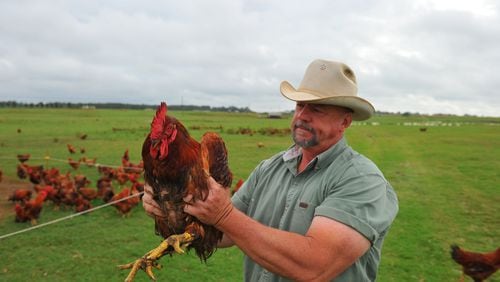This is how the New York Times put it in a recent story: If the Southern organic crowd were all teenage fan girls, William Harris III would be their Justin Bieber.
Harris, as his family has for years before him, raises animals in southwest Georgia. But where they were cattle-raisers, Harris is an everything-raiser. His White Oak Pastures, in Bluffton, is the most diverse organic farm in the South and the largest in Georgia.
As the AJC's John Kessler wrote in 2012 Personal Journey on Harris, "Row by row, [he] is breaking the mold on farming in Georgia. His organic grass-fed cattle are slaughtered with methods animal welfare advocates call commendable, and steaks from his beef are cooked and plated in Atlanta's finest restaurants."
White Oak is the only farm in the U.S. with federally approved slaughterhouses for both poultry and mammals, according to the Times. And Harris and his partners were among the first in the country to import Spain's Iberian pigs.
"He grows vegetables and raises 10 species of animals, most of which roam around in a model of farming based on the way animals graze on the Serengeti plains. ... The idea is that together, the animals make a stronger ecosystem," wrote the Times' Kim Severson. (She added,"Some eat certain plants but not others. Some species eat the feces of others.")
Harris has his critics -- those, he said, who don't like him for the attention he brings to how most beef is produced; and then those, like Athens farmer Daniel Dover, who said Harris is not transparent enough.
"My life has turned into explaining what I do,” Harris told the Times. “This organism won’t work unless the consumer understands it."






